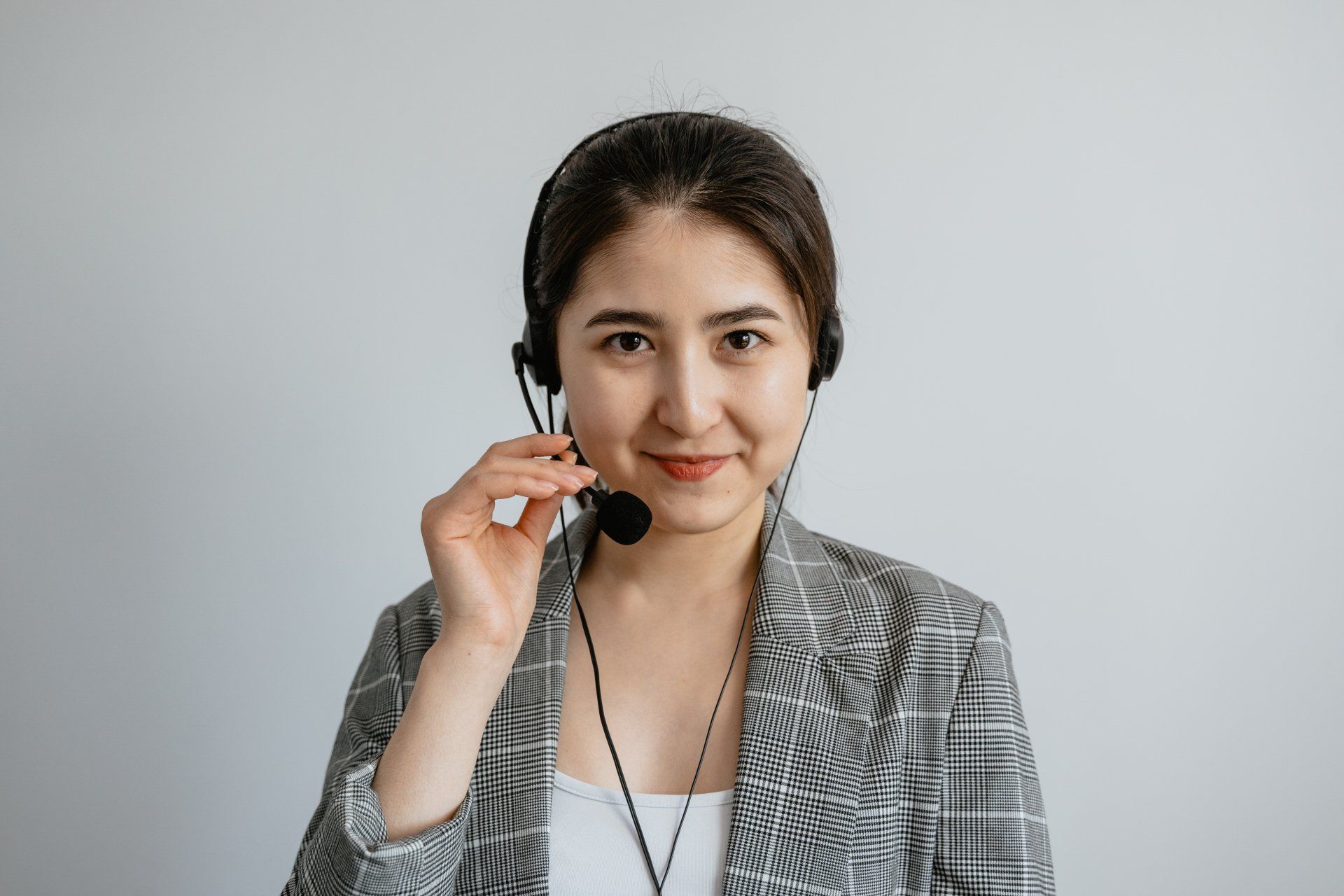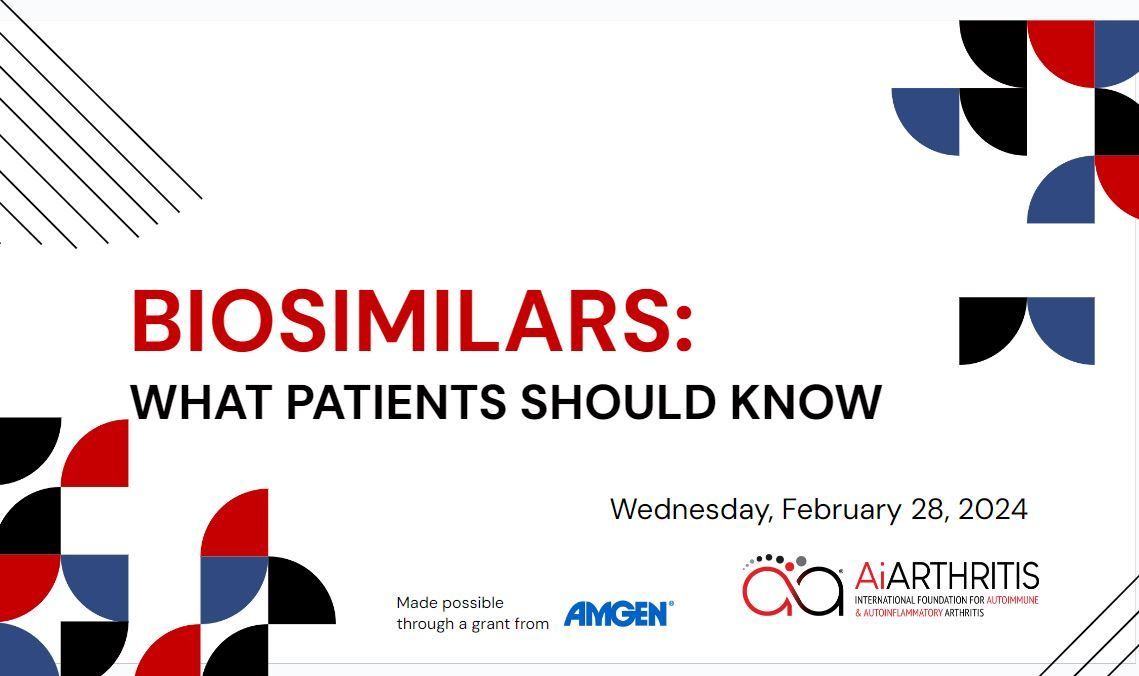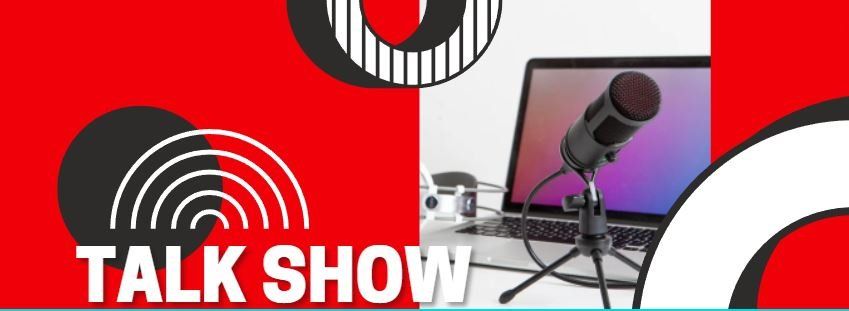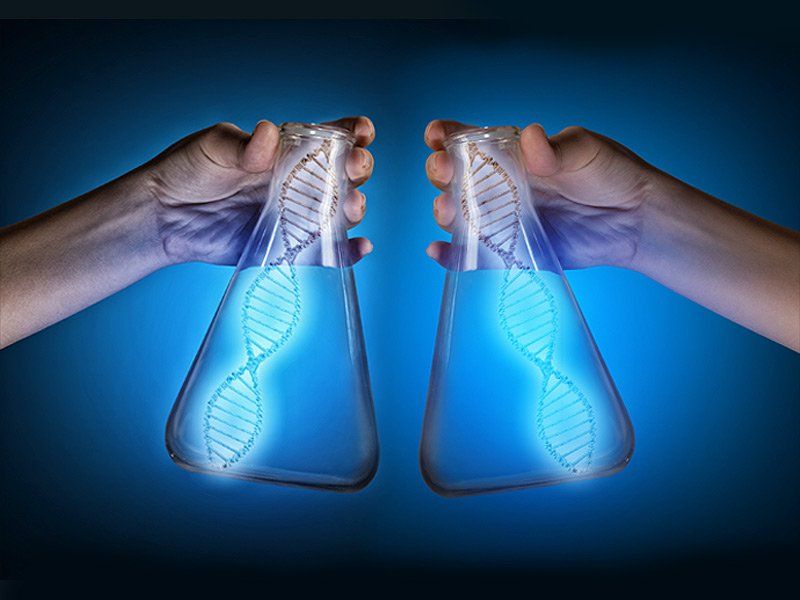- HOME
- ABOUT US
- WHAT IS AiARTHRITIS
- Diseases
- Rheumatoid Arthritis (RA)
- Psoriatic Arthritis (PsA)
- Systemic Lupus Erythematosus (SLE)
- Sjögren's Disease (SD)
- Axial Spondyloarthritis (AxSpA)
- Crohn's Disease
- Sarcoidosis
- Relapsing Polychondritis (RP)
- Systemic Sclerosis/Scleroderma (SSc)
- Behcet's Disease (BD)
- Palindromic Rheumatism (PR)
- VEXAS
- Antisynthetase Syndrome (ASS)
- Mixed Connective Tissue Disease
- JIA
- Familial Mediterranean Fever (FMF)
- HIDS (hyper-IgD syndrome, a mevalonate kinase deficiency)
- Cryopyrin-Associated Periodic Syndromes (CAPS) - Familial Cold Autoinflammatory Syndrome, Muckle-Wells Syndrome
- Schnitzler Syndrome
- Chronic Nonbacterial Osteomyelitis (CNO)/Chronic Recurrent Multifocal Osteomyelitis (CRMO)
- Still's Disease
- All Diseases
- Diseases
- OUR WORK
- RESOURCES & TOOLS
- GET INVOLVED
- CONTACT US
Biosimilar Education
We focus on listening to comments and concerns from the patient community in regards to biosimilars. Based on that information, we help create educational materials so they understand what they are and how they may affect our healthcare system.

PEER-LED BIOSIMILARS HOTLINE
We understand you may have questions. We are here to help!
Our leadership includes people diagnosed with these conditions and who use biologics and biosimilars. We are here as educators, peers, and supporters.
Let us know what's on your mind by submitting your questions and comments about biosimilars.
CHECK OUT OUR PATIENT-LED BIOSIMILARS RESOURCES
-
RESOURCES
Button**Happy Hour**
What is a biosimilar?
A biosimilar is a drug that is designed to be very similar to an existing biologic (called the reference product). The key word is "similar"; they are not generic versions of biologics. To be a generic drug, the new treatment must be an exact copy of the product it intends to replicate. Treatments, like aspirin, are chemically manufactured with simple structures – this makes them simple to replicate into a generic form. A biologic and a biosimilar are not chemically manufactured. They are both produced by living cells – in other words, they are grown, not made, so their structure is very complex. Biosimilars have been on the market in Europe for several years, but only recently have come to market in the US and Canada.
Our organization is a member of the Alliance for Safe Biologic Medicines (ASBM), the main coalition (international) working on legislative (access) issues related to biosimilars. In June 2018, we were one of first organizations invited to advise the US Food and Drug Administration (FDA) as they develop new patient education materials about the biosimilars regulatory process.
- Providing patients with easy to understand educational materials about the safety and efficacy of biosimilars, in addition to information relevant to help them communicate with their physician about this option for their personal care.
- Patient access to the best treatment options for them as determined by the patient and their healthcare provider, whether a biosimilar or reference biological product.
- Patients who are stable on an existing biologic treatment should not be required to switch to a biosimilar if there is any concern from their practitioner that doing so could disrupt continuity of care.
- Patients who are newly diagnosed, or who are not stable on an existing treatment, should use a biosimilar product when recommended by their physician and available in their country.
- Working with the FDA, EMA, and other regulatory agencies to ensure that relevant information is accurate, consumable, and readily accessible for patients and providers.
Some of the most commonly asked questions
-
What is a biosimilar?
A biosimilar is a replication of a biologic already on market (which is called 'the reference drug'). It cannot be a generic drug because biologics and biosimilars are made from living cells and grown in laboratories. Generic medicines, like an aspirin, are simple structures and can be replicated simply by a machine. The biosimilar has copied the active ingredient in the reference drug, but other non-active ingredients may differ in manufacturing.
-
What's an Interchangeable Biosimilar?
In the United States, a biosimilar that earns the label "interchangeable" it means the biosimilar company has provided additional data to demonstrate that it a patient who is switched repeatedly between the reference product and the biosimilar can expect the same clinical result, without additional risks, relative to a patient who wasn’t switched.
As of early 2024 in the USA, only interchangeable biosimilars can be substituted by pharmacies. But there are current efforts that may change this, where the pharmacist can switch a biologic with ANY biosimilar. This is the practice in Europe, where the word "interchangeable" is not associated with additional research - they feel all biosimilars, regardless of the additional research - are so close of a replica of the original there is no real difference.
Other issues patients cite regarding labeling a biosimilar interchangeable would be that the biosimilar may have different modes of using it (harder to self-inject) or may not include the chemical that lessens the stinging sensation.
-
Are biosimilars safe?
Yes. These medicines had to prove in clinical trials that they are just as safe and effective as the original biologic. At first, AiArthritis and other patient organizations and doctors were not sure if they were safe, but many studies have been done in patients to make sure if switched to the biosimilar that the patient would not have a reaction or lose efficacy.
There are still some concerns around switching a patient who is stable. At this time, it is more accepted by doctors to switch a patient to a biologic if 1) they are biologic naive, meaning they've never used any biologic before, 2) if the patient is fairly controlled and would likely not lose efficacy if switched, and 3) if it's time to change biologics altogether.
In Europe, the European Medicines Agency (EMA) in 2022 named biosimilars "interchangeable" with the brand name drug. That means the brand name drug ("reference drug") "can be replaced with the biosimilar without a patient experiencing any changes in clinical effect." Learn more As of February 2023 in the United States, the FDA has not stated biosimilars are interchangeable.
-
What do I do if I'm switched to a biosimilar?
First, don't panic. Biosimilars have been tested in clinical trials and have demonstrated they are safe and as effective as their originator, reference drug. However, most physicians do not wish to switch a patient to a new medicine when they are doing well on their current therapy. But if the switch saves the patient or healthcare system money, it may happen.
In most of Western Europe, automatic substitution of biosimilars is rare – and banned in many jurisdictions. Throughout Eastern Europe, however, financial resources are often more limited. As a result, automatic substitution is commonplace. It is also common in Australia. In Canada it varies by province.
So where you live matters. Some countries in Europe respect the patient-doctor decision more than other countries, like the United States.
If you live in the United States, are switched, and your doctor has concern they will file an appeal. This is called "non-medical switching" by an insurance company, because they switched to save money and not because it was to better manage your disease. However, if you are doing well on a biologic, it is highly likely you will also do just as well on its biosimilar.
-
Is there any reason I should not be switched to a biosimilar?
If a patient is not doing well on the original biologic, then they also will likely not do well on its biosimilar. So if you are not experiencing good outcomes from your biologic, you may want to talk to your doctor about switching to a new drug entirely.
Some patients have complex situations where the rheumatologist may be concerned switching could disrupt good health. For example, the biosimilar may have a different injection model that may make it more difficult for a person to use. Or it may not have a preservative that helps reduce sting. These non-active ingredients or design elements may impact adherence and, in turn, cause elevated disease activity.
-
Are there benefits from using a biosimilar?
Yes! In most countries, the use of biosimilars should lower costs to the healthcare system, which means more people with many conditions will have more access to the treatments they need. Patients may even see a discount. Savings has been demonstrated in Europe, but we will not know how much savings for patients - if any - will happen in the United States because of the healthcare system model and use of Pharmacy Benefit Managers (PBMs).
-
Are there manufacturer assistance programs?
We advise you to check the website of the manufacturer who makes your biosimilar for more information, as support programs may vary per country. These are common in the United States for patients who are not on government programs, like Medicare.
-
Will I save money using a biosimilar?
Maybe. In European countries the use of biosimilars has made a difference in the funds available to the healthcare system (but it may not affect patients directly). In the United States, we have heard from some Medicare patients that biosimilars have helped them afford their medicines, as biologic/biosimilar manufacturer assistance plans are not available for those using this government program.
One reason some USA rheumatologists are reluctant to switch patients to biosimilars is because it is unclear there is any cost savings will be passed to them (or even to anyone other than the pharmacy benefit managers who negotiate prices and pocket the profits themselves).
Patient-Led Resources
Webinar: Watch the Recording!
Biosimilars: What Patients Should Know
Biosimilars are highly similar (and potentially lower cost) alternatives to the biologic medicines commonly used to treat AiArthritis diseases.
Many health plans and governments (depending where in the world you live) are increasingly switching their patients to biosimilars to try control costs, but many physicians and patients still have concerns about switching. Then again, several patients HAVE made the switch and now can help the rest of us navigate the journey.
Watch the recording of Tiffany, AiArthritis CEO and person with Axial Spondyloarthritis, Ray, AiArthritis Patient Advocate Consultant and person with Psoriatic Arthritis, Deb and Rick - patients with rheumatoid arthritis who have switched to a biosimilar and share their experiences, and Dr. Vibeke Strand, rheumatologist - and all the conversation in the chat.
We answer a lot of your questions regarding biosimilar safety, potential "nocebo effect" (which is potentially causing a biosimilar not to work based on strong negative feelings or fear), and more.
Transcript, with all the Q and A's answered, coming soon!



AiArthritis Voices 360 Talk Show: Biosimilars - Interchangeability and Switching 2023
What do patients need to know about the upcoming changes to biosimilars and interchangeability in 2023?
In this episode, Tiffany is joined by esteemed guest experts Michael Reilly, Dr. Ralph McKibbin and Andrew Spiegel to explore the crucial distinctions between interchangeability, automatic substitution, and non-medical switching. Gain valuable insights into how these differences impact patients not only in the USA but also on a global scale.
In addition, our guests discuss the latest proposed bills in the US regarding biosimilar interchangeability, offering expert perspectives on the legislative developments and their implications for patients and healthcare providers alike.
Join us on this episode as we explore the latest updates in biosimilar interchangeability and share ways to raise your voice against non-medical switching without physician involvement.


AiArthritis Voices 360 Talk Show Episode 77: Biosimilars - What patients should know
Join Tiffany Westrich-Robertson, CEO of AiArthritis and person living with spondyloarthritis, as she welcomes three experts - Dr. Ralph McKibbin, Andrew Speigel, and Michael Reilly - who all have leading roles in the Alliance for Safe Biologic Medicines coalition (which AiArthritis is a member). Today we put the topic of biosimilars on the table, but this is just the beginning.
In this first hour, listen to the patient voices, a doctor, and biosimilar access and switching experts, as they discuss some important topics such as What are Biosimilars, What is Non-Medical Switching (being switched your medication for cost savings and not for medical reasons), and more. Then check out all the bite-sized "360it" segments from the episode AND that continue the discussion post-episode!

FEATURE RESOURCE: Download the Patient Education Biosimilars Toolkit
Includes key terms to understand, questions to ask your doctor, and more. Designed and published by the World Patient Alliance and the Global Colon Cancer Association, 2022.
Other Suggested Resources:
International
- Alliance for Safe Biologic Medicines serves as an authoritative resource center for the public, medical community, the U.S. Food and Drug Administration and government regulators worldwide as biosimilars policies are developed and implemented. Learn more.
- Biosimilars Training for Patient Advocacy Organizations (and Patients). Free educational virtual training that provides tools to help you better understand biosimilars. https://learnbiosimilars.org/
United States
- US Food & Drug Administration. Learn more.
- Global Healthy Living Foundation/CreakyJoints "Patient Guide for Understanding Biosimilars" Learn more.
- Arthritis Foundation Learn more.
- American College of Rheumatology (ACR) on biosimilars.
Learn more.
Canada
- Biosim•Exchange, a program by Arthritis Consumer Experts (ACE)/JointHealth where you can get the latest biosimilars news and background analysis. Learn more.
- Health Canada is the Federal department responsible for helping Canadians maintain and improve their health, while respecting individual choices and circumstances. They are also responsible for regulating biosimilars in Canada.
Learn more.
Europe
- European Medicines Agency (EMA). The Agency is responsible for assessing applications from companies to market biological medicines for use in the European Union (EU), including biosimilar medicines. The European Commission issues decisions concerning the authorization of biosimilars on the basis of the scientific opinions from the EMA. Learn more.
- European League Against Rheumatism (EULAR) position on biosimilars. Learn more.
- Global Alliance for Patient Access (GAfPA) is the International Network of Physicians & Advocates for Patient Access, primarily working in Europe, Latin America, Asia, and Australia.
Learn more.
Australia
- Australian Government Department of Health/The Australian Government’s Pharmaceutical Benefits Scheme (PBS) provides reliable, timely and affordable access to a wide range of medicines for all Australians.
Learn more.
Thank you to our program sponsors:


Sign up for our newsletters
International Foundation for AiArthritis
6605 Nottingham Ave.
St. Louis, MO 63109-2661
Toll Free: 1-877-609-4226
Text: 1-314-282-7214
Copyright 2024. All rights reserved. Information on this site is intended for informational purposes only Our foundation does not engage in the practice of medicine. Please consult a physician to obtain personal healthcare and treatment options. 501(c) 3 Nonprofit Tax ID: 27-1214308.




